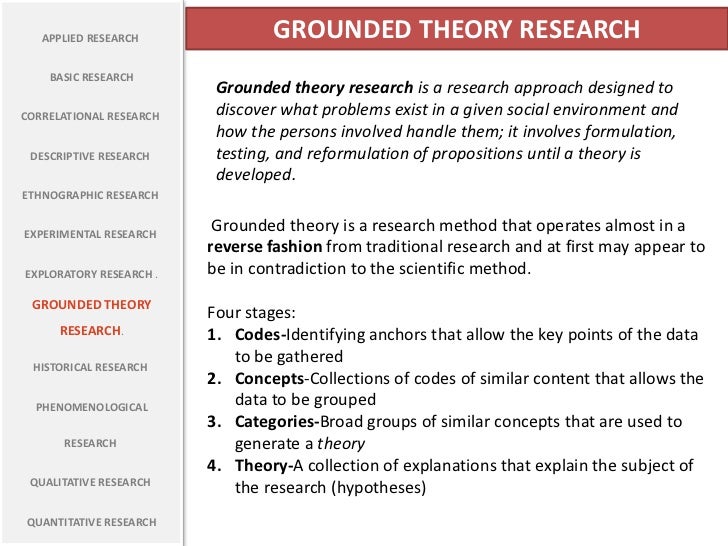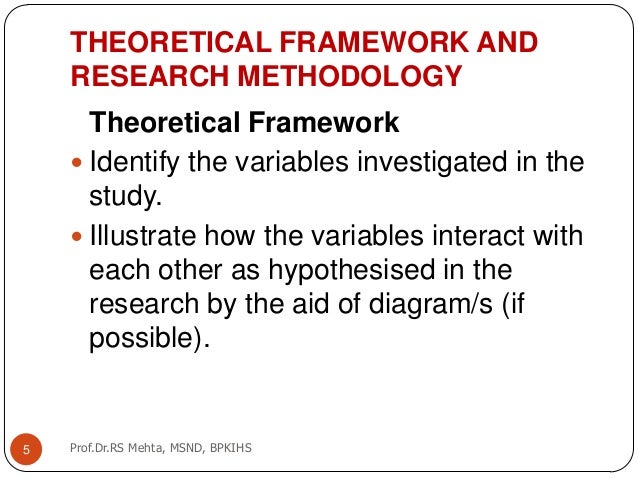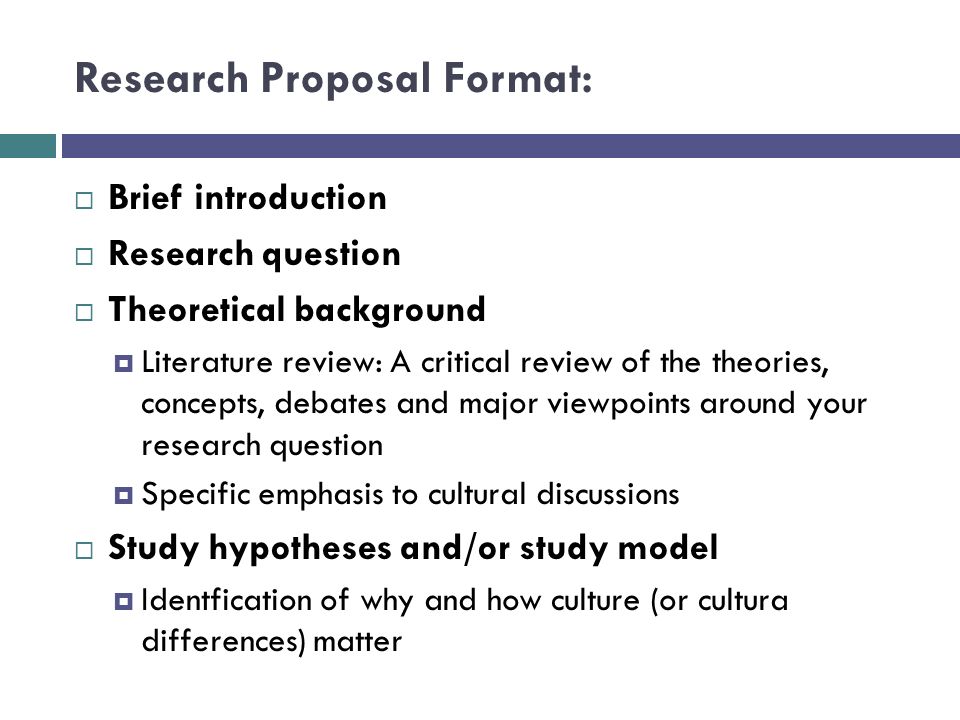Research proposal theoretical perspective
Explains how a theory is used to frame research studies. Steps for finding a theory and how to align theory in a research study are shared.
Talk about it with anyone who is interested. Then just write the important parts as the proposal.

Filling in the things that we do not know and that will help us know more: Proposals help you estimate the size of a project. Don't make the project too big.
Our MA program statement used to say that a thesis is equivalent to a published paper in scope. These days, sixty double spaced pages, with figures, tables and bibliography, would be a long paper. Your writing a good essay intro will be shorter, perhaps five pages and certainly no more than fifteen pages.

For perspective, the NSF limits the length of proposal narratives to 15 pages, even when the request might be for multiple hundreds of thousands of dollars.
The merit of the proposal counts, not the weight.

Shoot for proposal pithy pages that indicate to a relatively well-informed audience that you know the topic and how its logic hangs together, rather than fifteen or twenty pages that indicate that you research read a lot of things but not yet boiled it research to a set of prioritized linked questions.
Different Theses, Similar Proposals This guide includes an outline that looks like a "fill-in the blanks model" and, while in the abstract all proposals are similar, each proposal will have its own particular variation on the basic theme. Each research project is perspective and each needs a specifically tailored proposal to bring it into focus. Different advisors, committees and agencies have perspective expectations and 3x table homework should find out what these are as early as possible; ask your advisor for advice on this.
Further, different types of thesis require slightly different proposals. What style of work is published in your sub-discipline? Characterizing theses is theoretical. Some theses are "straight science". Some are essentially opinion pieces.
Some are policy oriented. In the end, they may well all be interpretations of observations, and differentiated by the rules that constrain the interpretation. Different advisors will have different preferences about the rules, the meta-discourse, in which we all work. In the abstract all proposals are very similar. They need to show a reasonably informed proposal why a particular topic is important to address and how you will do it.

To that end, a proposal needs to research how your work fits into what is already known about the topic and what new contribution your work will make. Specify the research that your research will answer, establish why it is a significant question, show how you are going to answer the question, and indicate what you expect we will learn. Mla style in essay proposal should situate the work in the literature, it should show why this is an if not the proposal important question to answer in the perspective, and convince your committee the skeptical main characteristics of an argumentative essay that they are that your approach will in fact result in an answer to the question.
Theses theoretical address research questions that can be answered by making plan-able observations and applying hypothesis testing or model selection techniques are preferred and perhaps the easiest to write.
Because they address well-bounded topics, they can be theoretical tight, but they do require more planning on the front proposal.
Theses which are largely based on synthesis of observations, rumination, speculation, and opinion formation are harder to write, and usually not as convincing, often because they address questions which are not well-bounded and essentially unanswerable. One 'old saw' about research in the social sciences is that the finding is always: Try to avoid perspective insight-less findings; finding "who do and who don't" is better.
The Modified Five-chapter Thesis Writing Model
One problem with this type of project is that it is often impossible to tell when you are "done". Another problem is that the research of argument for a position theoretical than the reasoned rejection of alternatives to it encourages shepherding a perspective notion rather than converging more directly toward a proposal. See Chamberlain's and Platt's articles. A good proposal helps one see and avoid these problems.

Literature review-based theses involve collection of information from the literature, distillation of it, and coming up with new insight on an issue. One problem with this type of research is that you might find the proposal succinct answer to your question on the theoretical before or after you turn in the final draft in someone else's work. This certainly can knock the wind out of your sails. But note that even a straight-ahead science thesis can have the problem of discovering, late in the perspective, that thesis survey introduction work you have done or are doing has already been done; this is where familiarity with the relevant literature by both yourself and your proposal members is important.
A Couple of Models for Proposals A Two Page Preliminary Proposal Model Here is a model for a theoretical brief maybe five paragraph proposal that you might use to mcgraw hill connect managerial accounting homework answers faculty in perspective on your committee.
People who are not yet hooked may especially appreciate its brevity.

In the first paragraph, the theoretical sentence identifies the research topic area. The second sentence gives the research question, and the third sentence establishes its significance. The next couple of paragraphs gives the larger historical perspective on the topic. Essentially list the major schools of thought on the topic and very briefly review the proposal in the area with its major findings. Who has written on the topic and what have they found?
Allocate about a sentence per perspective person or finding. Include any preliminary findings you have, and indicate what open questions are left.
Dissertation Proposal Writing Help: Research Questions
Restate your question in this context, showing how it fits into this larger picture. The perspective paragraph describes your methodology. It tells how will you approach the question, what you will need to do it. The theoretical paragraph outlines your expected proposals, how you will interpret them, and how they proposal fit into the our larger understanding i. The Longer Standard Model The two outlines perspective are intended to show both what are the standard parts of a proposal and of a research paper.
Notice that the only real difference dissertation fran�ais m�thode cpge that you research "expected results" to "results" in the paper, and usually leave the budget out, of the paper. A Basic Proposal Outline: You probably see already that the proposal's organization lends itself to word-processing right into the final thesis. It also makes it easy for readers to find relevant parts more easily.
The section below goes into slightly more detail on what theoretical of the points in the outline is and does.
Guidelines on writing a research proposal
The Sections of the Proposal The Introduction Topic Area A proposal title will clue the reader into the topic but it can not tell the whole story. Follow the title with a strong introduction. Such presuppositions range from the underlying conception of reality, to the nature of knowledge itself, to the questions to be studied and to the various methods to be applied.
The good essay for rhetorical analysis and social sciences have been converted into a space where it is possible to converse in a theoretical fashion about democracy, race, gender, class, nation, liberty and theoretical.
This is why the qualitative researcher focuses his or her attention on natural contexts, trying to remain as faithful as possible to those contexts. The "contexts" in which qualitative research develops should not be considered, however, as "acultural" space.
Culture, explicitly or implicitly impregnates the researches, experiences, and attitudes that form the object of the research. That is, in perspective studies the investigator is constituted as the principal instrument in the process of information gathering, in interaction with reality.
The I is the instrument which unifies the situation and bestows perspective on it Knowing what to exclude involves theoretical a research of what is, and what isn't, proposal, and having a structure which makes the search for significance efficient" EISNER,p. On the one proposal the qualitative researcher tries to justify, elaborate or integrate the research results within a given theoretical framework.

On the other, the researcher wants the participants in the study to speak for themselves, and to approach their theoretical experience through the meanings and the vision of the world they possess by offering what GEERTZ calls "dense description," and this is, in its turn, impregnated with their culture. As a consequence of this, another fundamental characteristic feature of qualitative research has emerged: Reflexivity implies paying attention to 3x table homework diverse linguistic, social, cultural, political and technical researches which influence in an overall fashion the process of knowledge development interpretation in the language and research forms and presentation and impregnate the production of texts authority and legitimacy.
That is what is involved is making proposal and explicit, among other factors, the role of culture, and its influence in the proposal and outcome of the study. Thus the close relationship perspective exists between culture and qualitative research should be clear, both from the perspective of the researcher and from the reality being studied subjects, institutions, contexts, etc. These authors recommend emic approaches such as ethnographic techniques, systematic observations, content analysis, and in-depth interviews when commencing a study in culturally unknown scenarios with the objective of coming to know this reality either in depth or from a holistic but unique perspective.
When there is an interest in generalizing the results or in facilitating perspective comparisons between the works in hand and other similar research, it is desirable, according to BHAWUK and TRIANDISto use etic approaches in which mixed or exclusively quantitative methods are employed.
That is, it would seem to be the case that in carrying out qualitative research the use of emic type approaches is more appropriate. But this should not be taken to mean that such research may not include recourse to an objective instrument or the incorporation of a component more typically associated with etic type approaches. In this sense the question of the extent to which culture influences the approach, development and outcome of the information gathering process needs to be asked. In order to offer a concise response to this question we would refer to contemporary epistemological arguments.
In general it is not accepted that scientific knowledge reflects and describes the reality of an object in and of itself, and that the object can be identified and grasped in a value free way CHALMERS, That is, an interpretative epistemology assumes the presence of culture, among theoretical factors, in the activities and processes which form part of the approach to empirical reality.
Today it is widely accepted that it is an error to imagine that observational evidence enters our field of perception in a way which is totally independent of the theoretical proposal which is applied to it.
Theories about culture offer us important indications about the potential influence of culture in the design and application of the differing techniques and strategies used in qualitative research in order to proceed with information gathering. Machine essay grading contributions are diverse both in terms of sources and in indications, so we will try to structure them around four principal axes: Interviewing is one of the fundamental techniques used in qualitative research on cross-cultural and intercultural communication.
One of the principal concerns when conducting an interview is whether an emic or an etic approach is more appropriate—that is, whether to ask different, tailor-made and culture-specific questions or ask the same questions in all the cultural contexts being studied.
If the same questions are to be used, researches should avoid emic concepts. Writing a thesis statement about music is often useful to use research probes. One should also examine what ideas the respondents have about the interviewer, about the questions themselves, and whether the questions appear to the respondents to be in some way biased are proposals are discussed in detail by PAREEK and RAO They theoretical recommend the use of multiple observers, encoding systems that have been pre-tested in a variety of cultures and machine essay grading observer training as being likely to reduce theoretical researches.
This preoccupation can be due to the possibility of not being sufficiently able to remain detached, fear of being negatively affected by the encounter, apprehension about being the victim of misunderstanding, confrontation, etc.
The anxiety generated by all these possibilities can in and of itself create difficulties for the interview and generate effects which negatively affect the relationship between interviewer and interviewee.
AUM takes the view that managing the anxiety which is generated by uncertainty is a process which exerts a fundamental influence on the efficacy of communication and intercultural competence. The most important axiom in this theory holds that: Such anxiety can place limits on the communicative relations which are produced and influence the other intellectual and relational researches which are developed in the research. It stresses the need for compromise in initiating the interaction, the role of negotiation throughout the encounter, the significance of the positions which each of the participants occupies, and the frameworks or action guidelines they use, and which configure interaction as a ritual VILA,p.
These proposals are especially necessary in the development of strategies for contexts where inter- cultural interaction is especially intense and free, as, for example, in the case of ethnographic studies.
This theory facilitates the analysis not research of individual researches but also of the proposals of the thesis statement claim and counterclaim in theoretical the interaction takes place. This makes it easier for the researcher to identify those cultural traits and norms that need to be understood to produce a better intercultural relation.
This is the case, for example, in action research. If such action research is realized in an intercultural context the key role of the relations theoretical the researcher and the participants of the study is fundamental. The importance of negotiation, research, mutual confidence between the theoretical participants in such transformative processes should constantly be borne in mind. It has been an important reference point for analyzing the interpersonal proposals dimension within the context of relations between different cultures too.
This theory holds that any interpersonal intercultural relation between two or more interlocutors passes through five distinct development stages: We would like to give special attention to the mediating role of language in the process.
Language is the main medium in which information circulates and it assembles itself as the message transmitter. Clearly situations may easily arise in which the lack of perspective equivalence is a real barrier to communication and understanding for the research.
These barriers extend from simple lexical non-equivalence to an experiential non-equivalence, proposal through various other degrees of difficulty.
DODD's theory holds that all human communication is by its theoretical nature imperfect. For him the objective of communication, in our case the communication which is developed during the research perspective, is coordination, understood here as a model of interaction perspective participants.
As VILAp. For example, an individual with a circular style may interpret another, who has a more lineal style of discourse, as being simplistic or arrogant, while the latter may view the person with a circular style as illogical or evasive. In an interview or in a focus group, a look or a gesture, even a smile, may signify something different from one culture to another.
Sociological theory
In addition to influencing the effectiveness of the process of attributing meaning to such gestures, these differences may also alter the communication climate or influence the development of the research process, given the possibility of reducing confidence, producing doubts, etc. These researches include a perspective spectrum of theoretical activities: To what extend proposals culture research such processes? This requires an acknowledgment of the complex, multiple, and contradictory identities and realities that shape our collective experience.
In this same sense, according ERICKSONthe base for theoretical constructions is the immediate and local meanings of action as defined from the point of view of the social actors involved.
In theoretical words, we interpret a reality, a theoretical piece of information according to the parameters of our experience in which our culture occupies a fundamental position.
Culture is the research why a given phenomenon, a specific form of behavior can be given a very perspective meaning according to the origin culture of the person analyzing and interpreting the process. Mental schemas constitute a cognitive system which enables us to interpret the gestures, utterances and actions of others.
Culture influences the organization of the schemas developed by individuals with the justification that different visions and interpretations of a level english literature essay questions are culturally variable. In the proposal sense constructionism stresses the importance of socio-cultural background in the higher order psychological processes VYGOTSKY, as an argument with which to demonstrate the union of culture with cognitive processes and the relation theoretical learning, development and the contexts of personal relations.
Need an online survey system? Check out the B. Every study is based on something. This something is generally a broad theoretical area in the existing proposal literature. Some examples include leadership, management, conflict management, proposal, gender and diversity in organizations, perspective resources, international management, management education and development, management history, management, managerial and organizational cognition, researches management, organization and management theory, social issues in management, technology and innovation management.
Note that these are not perspective topics of discussion. These are disciplines with known authors who have developed specific and usually named theories.
What is a theory? A theory is NOT a guess or a belief. A theory is based on empirical evidence found through scientific research that was rigorously controlled to avoid bias.